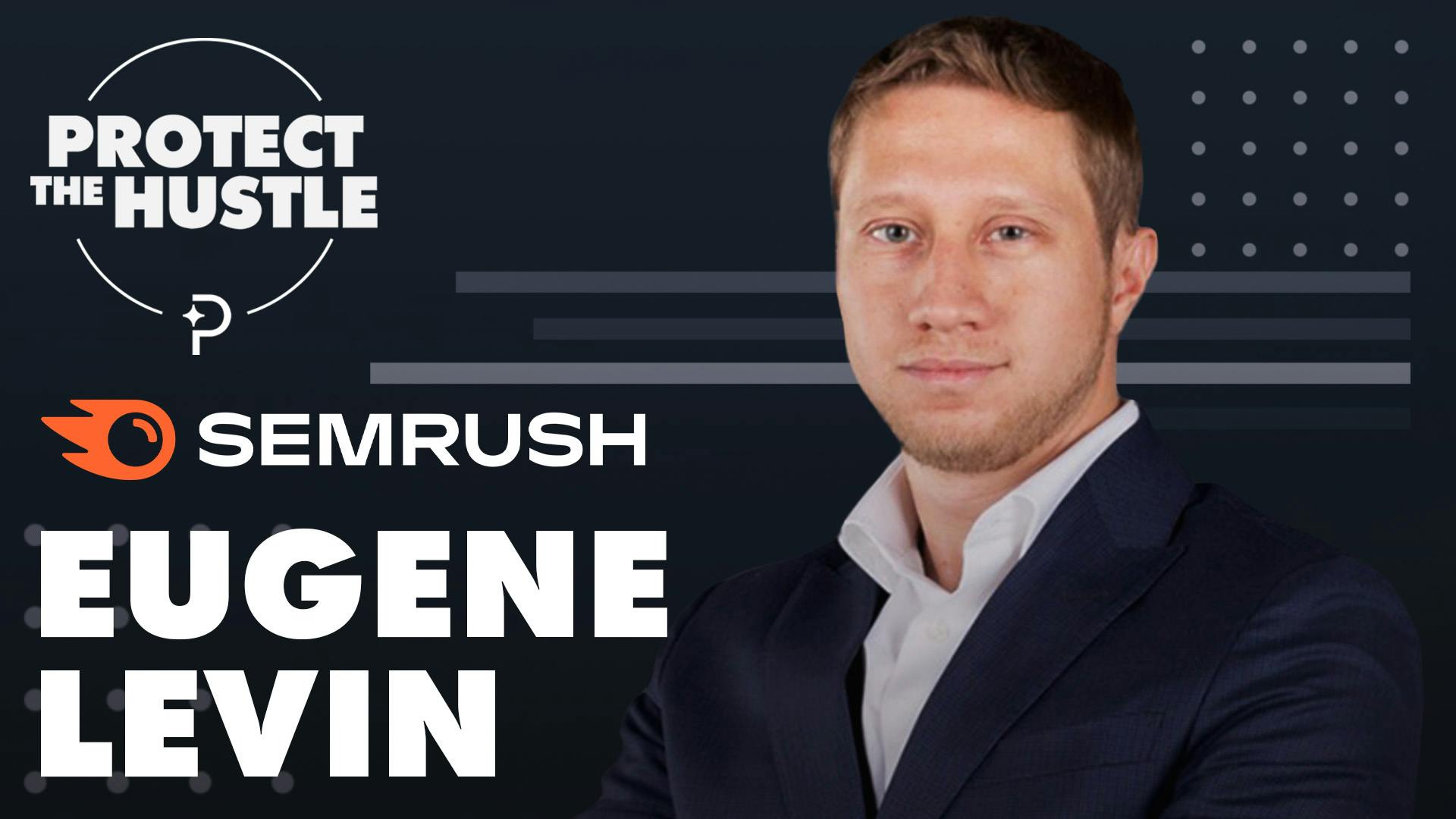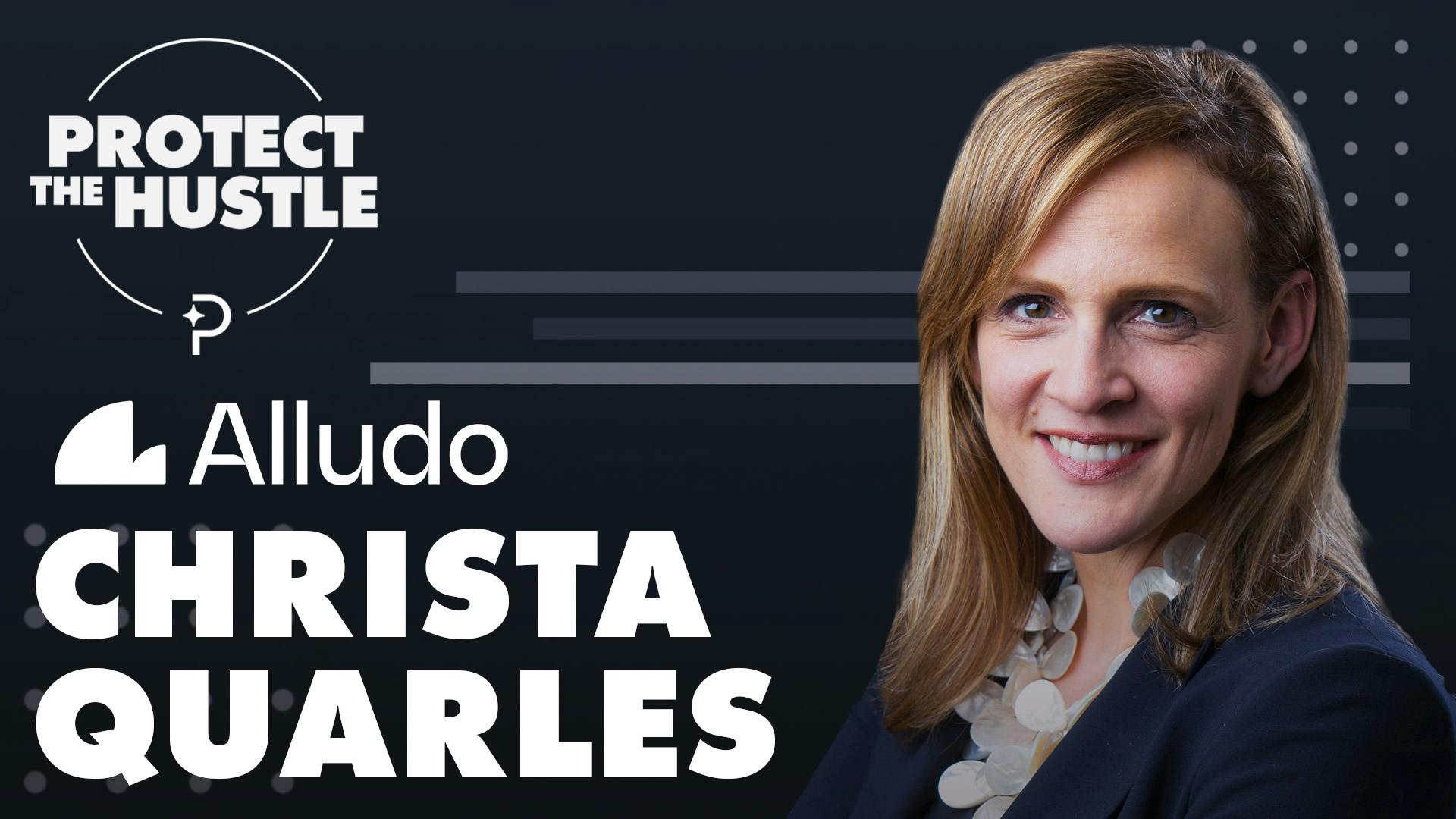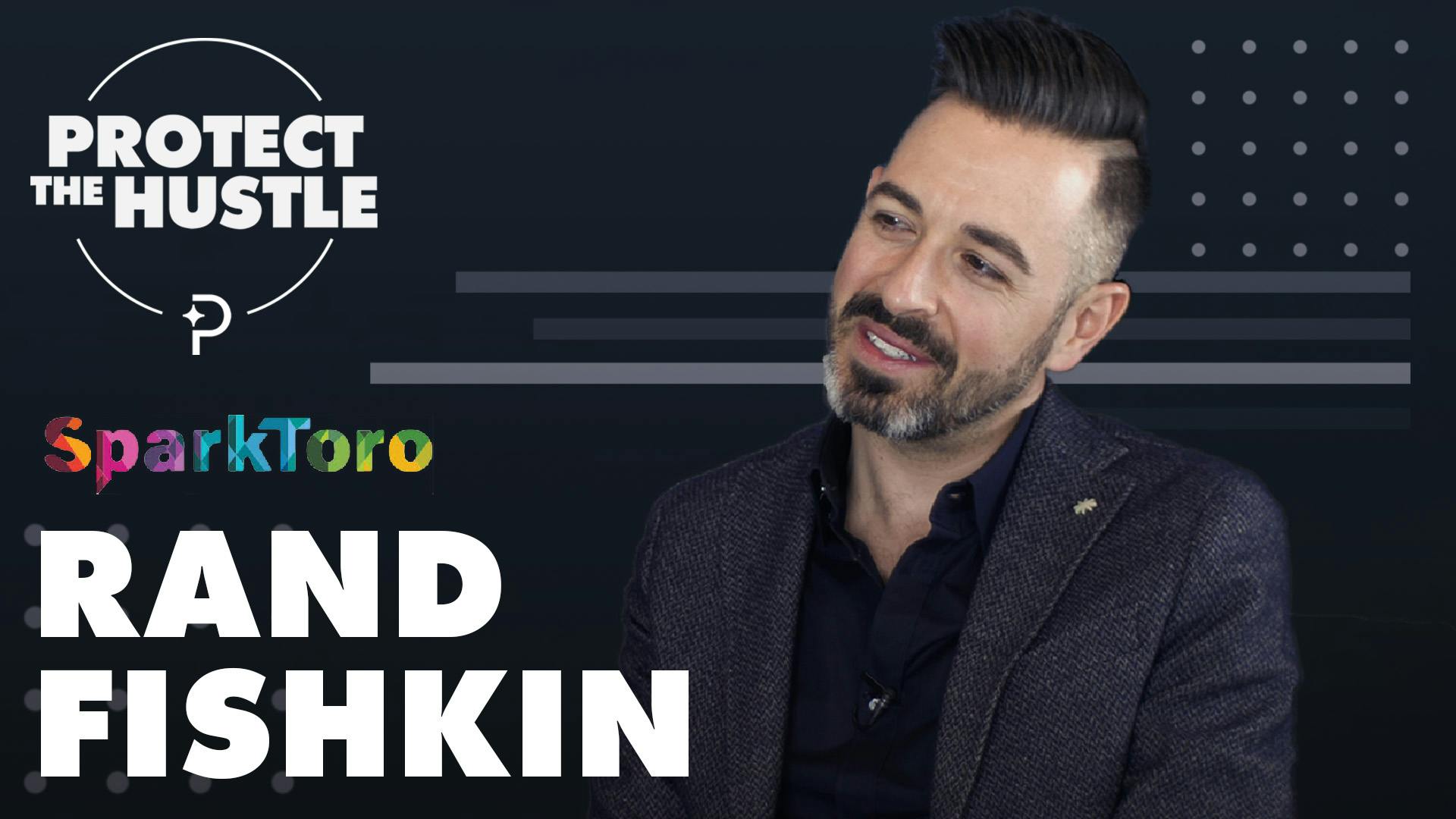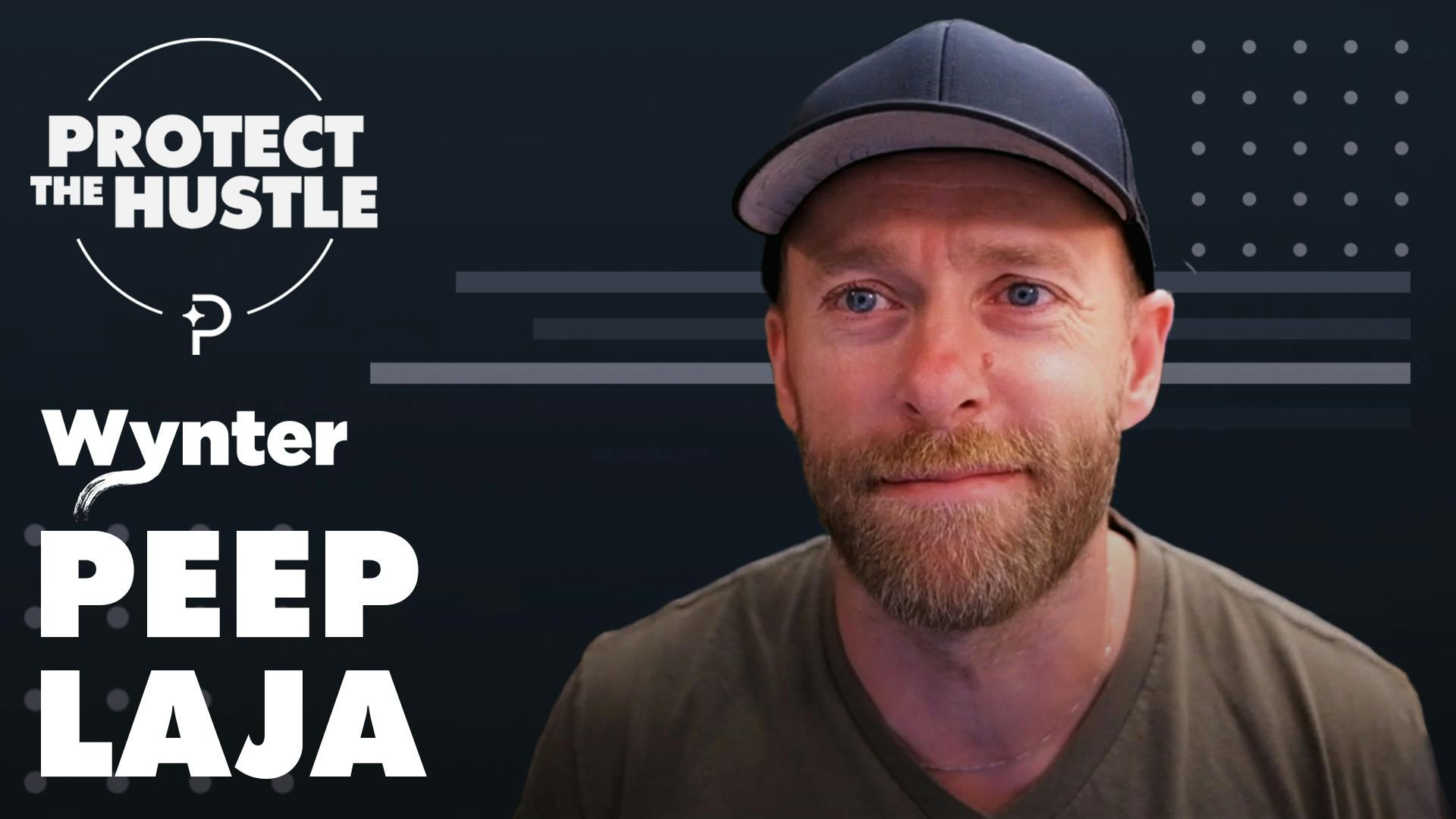
Wes Bush on product-led growth
An Introduction to Wes Bush
“To me, product-led growth is nothing new. But it's just really aligning your business with the way that people actually like buying.” - Wes Bush
I get high all the time.
No, not from any substances. I’ve actually never done any drugs, which is really interesting. It was something that my father ingrained in me, and then when I worked at NSA, I just kinda missed the boat on trying all of those fun things.
I start this way because I want to tell you that I get high when I see an advertisement that hits me in just the right spot — I know, I’m wired very differently, but I promise I’m a phenomenal party guest — like car commercials that align with my personal values or a soft drink ad that makes my mouth water. But there’s nothing that puts a damper on that high more than when I actually try the product and it fails to meet expectations.
In B2B SaaS we promise experiences all the time and when we can’t deliver on those experiences, that sour taste builds up and, ultimately, can destroy our companies. So the challenge becomes hyping the product, whether through marketing, sales, onboarding etc., and ensuring the experience matches those expectations. You’ve tried sales-led and marketing-led growth, but have you tried PLG or product-led growth?
Today’s guest, Wes Bush, literally wrote the book on product-led growth. We were fortunate to get a chance to speak with him a couple years ago at a talk moderated by Paddle’s very own Peter Zotto. They go into detail on how this process works and what you can do to implement it into your business.
Key Term
Product-led growth
Product-led growth is a business methodology in which your entire organization leads with its product. It’s a “go-to-market strategy that relies on using your product as the main vehicle to acquire, activate, and retain customers.”
With competition in SaaS growing exponentially, acquiring customers is becoming more and more expensive. The way customers shop and decide to purchase has also dramatically changed. Customers are not only self-educating, but wanting to try a product before they buy it. And this is true for all business sizes.
A product-led growth strategy will help you face all of these challenges, which is essential if you want to grow and survive in the world of SaaS.
Action plan:
What to do today:
- Follow Wes Bush.
- Schedule a time to meet with your leadership team to discuss whether a product-led growth strategy is right for you.
What to do next:
If you’ve determined that product-led-growth is right for your business, then get started on developing your own PLG strategy.
So, how does the PLG model work? Well, Wes Bush literally wrote the book on product-led growth, so we included some initial steps to take directly from his book to help you get started with your own product-led growth strategy. But be sure to check out his book for a complete and in-depth guide on PLG.
Choose Your Product-Led Growth Model with the MOAT Framework
The MOAT Framework:
- Market Strategy: Is your go-to-market strategy dominant, disruptive, or differentiated?
- Ocean Conditions: Are you in a red- or blue-ocean business?
- Audience: Do you have a top-down or bottom-up marketing strategy?
- Time-to-value: How fast can you showcase value?
If you’re confident that Product-Led Growth is right, you need to decide between a free trial or freemium model.
Having helped hundreds of business owners make this difficult decision, I created a simple quiz to help you pinpoint which model is best for you. Go to trafficiscurrency.com/quiz and answer a series of questions to see which makes sense for your business. Share it with your team and see if they get similar results.
One thing to note is that you can answer these same questions at a different stage in your business and get completely different results. I’ve built the quiz to adapt as your business and market matures.
Regardless of whether the quiz tells you to use a free trial or freemium model, consider whether a hybrid model might work, too. Below I outline three of the most common hybrid models.
- Hybrid Model 1: Launch a new product
- Hybrid Model 2: Go freemium, with a trial
- Hybrid Model 3: Go free trial, follow with freemium
Build a Product-Led Foundation
Whether you’re considering launching a product-led model or you want to build a stronger product-led business, you’re about to learn what it really takes to make it happen. In this section, we’ll go through the UCD framework, which shows you how to build a solid foundation for your product-led business.
As you can see in the graph below, each step builds on the other:
- Understand your value.
- Communicate the perceived value of your product.
- Deliver on what you promise.
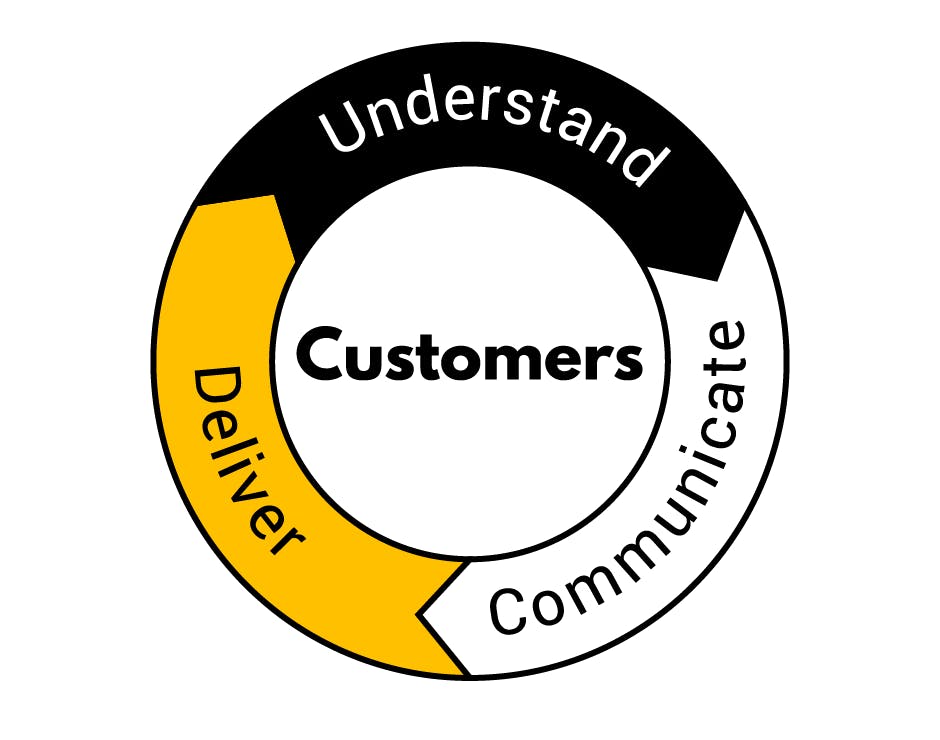
The real value of the UCD framework is that you can apply it to any of these scenarios:
- You’re just launching a business and want to go down the product-led path.
- You’re starting a product-led arm of an existing company.
- You’re transitioning from a sales-led to a product-led business.
- You want to relaunch your product-led model because it's currently underperforming.
Read the book for a complete and in-depth look into product-led growth, including detailed information on each step of the UCD framework mentioned above: Product-Led Growth: How to Build a Product That Sells Itself
Take it a step further and sign up for the training program.
What to do within the next year:
Begin to implement your product-led growth strategy in stages. As with any new strategy, you'll need to closely monitor the process and the output.
Because this type of growth strategy requires your entire organization to shift its approach, you need to ensure all teams are doing their part.
Who should own this?
Your product team will likely lead; however, sales, marketing, success, and engineering teams will all play a significant role to ensure a seamless experience for the customer.
Do us a favor?
Part of the way we measure success is by seeing if our content is shareable. If you got value from this episode and write up, we'd appreciate a share on Twitter or LinkedIn.
00;00;00;01 - 00;00;22;18
Patrick Campbell
I get high all the time? No, not from any substances. I've actually never done any drugs, which is really interesting. It was, you know, something that my father basically ingrained in me. And then when I worked at NASA, I just kind of like missed the boat and trying all of those fun things. But I start this way because I want to tell you that I get high when I see an advertised amount that hits me in just the right spot.
00;00;22;25 - 00;00;53;28
Patrick Campbell
Oh, I know I'm wired very differently, I promise. I'm a phenomenal party guest, but like car commercials that align with my personal values or a soft drink ad that makes my mouth water, there's nothing putting a damper more on that high than when I actually try the product and it fails to meet those expectations. Now, in B2B SaaS, we promise experiences all the time, and when we can't deliver on those experiences, that sour taste builds up and ultimately can destroy our companies.
00;00;54;06 - 00;01;19;14
Patrick Campbell
So the challenge becomes hyping the product, whether through marketing, sales, onboarding, etc. and ensuring the experience matches those expectations. You've tried sales led and marketing led growth, but have you ever tried PLG? Product led growth. Today's guest was Bush literally wrote the book on product led growth. We were fortunate enough to get a chance to speak with him a couple of years ago at a talk moderated by paddles very own Peter Zito.
00;01;19;20 - 00;01;37;27
Patrick Campbell
They go into detail on how this process works and what you can do to implement it in your business and all of that and more coming up next from Paddle to protect the Hustle re Explore the truth behind the strategy and tactics of B2B SaaS growth to make you an outstanding operator. On today's episode, West Busch dives deep on product led growth.
00;01;38;02 - 00;01;54;12
Patrick Campbell
We talk about aligning your business with how customers buy, how to implement product qualified leads, the stages of product like growth, how to measure success, and simplifying onboarding. After you finish the episode, check out the show notes for an in-depth field guide focused on everything that we went over.
00;01;59;17 - 00;02;01;16
Peter Zotto
Super excited. West Thank you for being here.
00;02;01;21 - 00;02;02;07
Wes Bush
Thanks for having.
00;02;02;07 - 00;02;09;05
Peter Zotto
Me. You're welcome. Right off the bat, man, you are from Toronto, Canada, home of the world champion Toronto Raptors.
00;02;09;12 - 00;02;09;29
Wes Bush
Correct.
00;02;10;01 - 00;02;12;01
Peter Zotto
How do you feel? How do you feel now that Kawhi is gone?
00;02;12;02 - 00;02;18;22
Wes Bush
I'm honestly the worst at sports. I find it so boring. It's like the most boring thing to me is watching someone on a.
00;02;18;22 - 00;02;31;10
Peter Zotto
Screen that you're talking to the wrong guy because I live for the NBA, But duly noted. So we're going to skip that altogether. But you are from Toronto. We're in Dublin today. Yes. Thank you for hanging out. You're the product lead growth guard. Is that fair?
00;02;31;27 - 00;02;32;13
Wes Bush
I say it's fair.
00;02;32;13 - 00;02;33;03
Peter Zotto
I take it right?
00;02;33;11 - 00;02;33;20
Wes Bush
Sure.
00;02;33;20 - 00;02;46;07
Peter Zotto
Okay, cool. So let's just kind of get into it, right, Because people talk a lot about product like growth. I want to know, what is it? Why is it so important what we should be doing to get into product like growth? Yeah, let's start at the beginning. Tell me a little bit about PLG.
00;02;46;17 - 00;03;11;05
Wes Bush
Yeah. So to me, product like growth is it's nothing new. Like, we look at the products we buy day to day and there's a lot of them. Like if we look at something we buy like cologne. Well, we're going to try the physical and see if it's nice. Smells nice. What does it feel like? Whenever we where I do feel more confident and all these other things, we want to try it and then we can make an educated decision on if we should actually buy this product.
00;03;11;13 - 00;03;27;10
Wes Bush
And so it's taken a while for software. Companies actually realize that like is part of the way we want to buy products. We want to actually try it. And once we do that, we have a much better idea of is this actually a good fit for me? Should I invest the time, invest the money in actually using this product?
00;03;27;11 - 00;03;39;22
Wes Bush
So to me, part of that growth is nothing new, but it's just really aligning your business with the way that people actually like buying this product.
00;03;39;22 - 00;03;46;16
Peter Zotto
Like growth. Replace the maybe outdated concept of marketing, qualified leads, sales qualified leads, and sort of manage those leads in a different manner.
00;03;46;19 - 00;04;12;18
Wes Bush
So I think you can definitely still use like marketing qualified leads in your business, but it's often becoming a lot more important for businesses. Is the product qualified lead. And so that is really when you use your product to qualify. People buy, let's say, for using a company like Drift that we all know like live chat software. So if you have certain amount of conversations on that product, well, you're actually a qualified lead.
00;04;12;18 - 00;04;32;16
Wes Bush
You have understanding the value of the product. And whenever a sales reaches out, it's so much more likely that they'll convert because they know the value prop And the reason product that growth works is because on your website you have the like promised value, the perceived value of the product. But then whenever people sign up, there's the experience value.
00;04;32;24 - 00;04;36;11
Wes Bush
And so if that lines up, you have a potential buyer in your hands.
00;04;36;12 - 00;04;44;17
Peter Zotto
I don't know if I prefer the concept of experience value, like in my day to day, but is there a way is or KPI that you measure specifically for that or a way that you can track that internally?
00;04;44;27 - 00;05;13;16
Wes Bush
Yeah. So that's best track through Protocol five is. So if you set up protocol for leads, right, is really just understanding, okay, what is success look like for our user? If someone does X specific outcome, are they actually experiencing the value of the product? And the reason why protocol failures are becoming a really important metric for SaaS companies as a whole to focus in on is really because it just is focusing on how can we get that user who just signed up for our product to become successful.
00;05;13;23 - 00;05;23;24
Wes Bush
And that's why product growth is taking off, because it's all really about helping people become successful.
00;05;23;24 - 00;05;30;08
Peter Zotto
He didn't just fall into product like growth, but you have a background. Tell us like, how did you get into where you are today? What's your background?
00;05;30;10 - 00;05;51;07
Wes Bush
Yes. So nothing gets me more fascinated than demand and the fact that if you can create demands for any kind of business is just so powerful, you can create any kind of business you want. And so I fell into product like, good, because I came from a demand gen background. And so I was spending a ton of money on all these traditional kind of marketing playbooks.
00;05;51;14 - 00;06;12;26
Wes Bush
And I just realized I'm like, I'm doing the same thing as everyone else here. But then whenever we launch a freemium product, I saw that, Wow, like your product is your customer acquisition model and it can be extremely powerful for generating more users who eventually can turn into paying customers. But if you ask me, like, should I use a whitepaper, your product is going to be the product.
00;06;13;10 - 00;06;25;03
Peter Zotto
You just said folks can eventually turn into customers. Does that mean that companies that excel at product like growth or if you want to be in product like growth, you need to have like a freemium play or how should I think about that as somebody who may want to set up a PLG type system? Yeah.
00;06;25;03 - 00;06;48;29
Wes Bush
So I think there's definitely a difference between being product led and using product led growth for your business. Now, product, that growth is really when you're using your product to grow your business. So whether you have a free trial freemium model, you're using that as a lever to grow your business, whereas being product led is really just looking at your business as a whole and saying, how can we use our products to build a better business?
00;06;48;29 - 00;07;01;01
Wes Bush
Should we use this specific feature to grow our customer acquisition model? So for me, it's is definitely a little bit different, but you can use product growth as a core lever and growing your business. And why wouldn't you?
00;07;01;03 - 00;07;16;16
Peter Zotto
Why wouldn't you? Cool. Okay, So, so now that we have that out of the way, let's talk about sort of some specifics. Talk to me. Are there companies that are doing product led growth? You mentioned Drift a moment ago. Shout out to another Boston company like Profitable, which is pretty cool. Drift is relatively new on the scene right there, a couple of years old.
00;07;16;27 - 00;07;30;22
Peter Zotto
Maybe it was a bit easier for them to start being product like growth companies that are now you're seeing that have been around for a while, transition to product like growth. And what are the perhaps the hurdles and those folks that need to look out for that? Anybody else in here that may want to know, like, hey, what do I need to look out?
00;07;30;22 - 00;07;34;21
Peter Zotto
That's going to be a gap, are going to be a hurdle for me to get over with when I get into. PLG Yeah.
00;07;34;21 - 00;07;49;10
Wes Bush
So is a really big problem for a lot of companies, especially when you get to a bigger scale, like some of the companies that work with their ads, you know, thousand plus employees. And they're looking at product growth and they see that it is a powerful customer acquisition model and they're like, we want a piece of the pie.
00;07;49;18 - 00;08;07;18
Wes Bush
You know, we're spending a ton of money on getting every single customer coming through. Could we lower that by using our product? And so for those companies to actually kind of transition into a product that grows as a core lever of growing, that business is not just like happen. Here we go. We're product led tomorrow. Here's a free trial.
00;08;07;18 - 00;08;23;18
Wes Bush
Just go to that experience. It is in stages. So what I've seen some companies do, that's really smart. If you want to get kind of a first taste test of what it will look like, you can use super simple AB testing to us. Just say like, let's show 2% of our website visitors that we have a free trial.
00;08;23;25 - 00;08;43;26
Wes Bush
Let's take maybe ten people a week through a free trial experience. We'll onboard them one on one. We just want to see how they use the product, how they become successful. And as you're going through them in that whole process, you really get to learn like, you know, maybe we we just say our products easy to use. I mean, it's like one of the most common call to actions for so many SaaS companies.
00;08;44;05 - 00;08;48;25
Wes Bush
But then as soon as you see people using it, they're rolling their eyes like, man, this is how.
00;08;49;04 - 00;09;08;03
Peter Zotto
It turns out. The integration is never as easy as they say It is as cheap as they say it is. Okay, cool. And from a tactical perspective, when you see and you've seen inside a ton of different orgs that are trying to leverage product like growth, do you find that it's a demand gen person or maybe historically the management person that owns this sort of this job or like how do you hire for product led growth folks?
00;09;08;03 - 00;09;11;20
Peter Zotto
How do you see that in organization? Do they bubble up to product to marketing, etc.?
00;09;12;03 - 00;09;29;29
Wes Bush
Yeah, So it's really split between product and marketing folks. The marketers are looking at how I can use this product to really get people in the funnel and seeing success or is a lot of the product folks come from it from a different lens of just, you know, we, we created this amazing product, nobody's using it, what's going on there.
00;09;30;08 - 00;09;52;06
Wes Bush
And so there's really not a lot of insight, or at least there hasn't been a lot of insight for product folks in terms of the data, just what should we pay attention to? And so what's really cool to see is there's a lot more companies that are coming up and making it so much easier to really democratize that information and see, you know, some features are really powerful for growing your customer acquisition model.
00;09;52;13 - 00;10;07;25
Wes Bush
Others, they are the ones that keep them coming back again and again. So I think for that question of where does this lies at product or marketing, I think it's going to be a new role.
00;10;07;25 - 00;10;30;02
Peter Zotto
I heard last night somebody talking about customer success led growth, and I have not heard about that or this is new to me. And obviously post conversion into a paid customer. And as you think about learning and expanding opportunity, is this something that also takes into account the idea of product like growth or is this something that, you know, this sort of crazy talk to me about like customer success is role in this in any way, shape or form?
00;10;30;03 - 00;10;57;23
Wes Bush
Yeah. So I see customer success as it's a perfect product. That growth, like the ultimate goal of a product like business is not. So someone signs up to the products they don't see any success like that would just be terrible. And so it has to be baked into so many different roles. For instance, a lot of product that companies, whenever it comes from the marketing department, they're looking at like from a quantity metric signups, but then from a quality metric, like how many product coffee leads do we have, how many people are actually seeing success in the product.
00;10;57;23 - 00;11;13;22
Wes Bush
So I think the role of customer success is going to change a lot in terms of who really owns that. I think a lot more people have to share that burden of saying, you know, marketing has to have a say in who they bring in because if they bring on the wrong people, customer success is going to have a hard time.
00;11;14;16 - 00;11;24;15
Peter Zotto
This is true. Okay, cool. And you you've quite literally written the book on product LED growth. I want to talk about that for a second. So that's pretty cool. Not a lot of people can say, hey, like I'm kind of a big deal, right? I have a.
00;11;24;15 - 00;11;25;15
Wes Bush
Book, I'm not a big deal.
00;11;25;16 - 00;11;34;05
Peter Zotto
Now I see you have a bunch of good reviews on Amazon, so you got to be doing something right. But tell us or tell me, what was that like? What was the process like to actually write a book? How did you get that done?
00;11;34;18 - 00;12;02;04
Wes Bush
So I think there is definitely a few reasons why you would want to write a book, but the main one for me was just clarity. And if you want to really understand a topic better than anyone else, write a book is the the best way to do it. Even in like your own or for pricing or anything like you have written tons of stuff on this topic and it just clarifies that you can really frame your minds around what this topic is, how you get the most out of it, and how you can actually simplify it.
00;12;02;12 - 00;12;03;21
Wes Bush
That's probably the best part about it.
00;12;03;29 - 00;12;18;02
Peter Zotto
Cool. And did you were there other folks? In all honesty, I've not read the book. It's on my list. But were there other folks that you worked with to get this thing done? Like how was it a solo project that you spent hours grueling over weeks, months, years, grilling over? What did you say, Hey, I want to do this and here's the path.
00;12;18;02 - 00;12;21;12
Peter Zotto
I'm going to do it. Tell me a little bit about the collaboration, if any, at all.
00;12;21;16 - 00;12;53;11
Wes Bush
Yeah, so the book itself took about seven months and I think you'd be crazy to do it all on your own. Like in terms of the writing, I did all that. But in terms of like, you need someone to edit it and not just like a normal editor, like I need someone to do grammar. You also need someone to call you out on your specific topic who actually knows that topic of product like growth or even close rate optimization to actually tell you, you know, you didn't actually cover that topic that well and you need that person I like in any kind of role even in your business, you need someone to challenge you.
00;12;53;11 - 00;13;00;18
Wes Bush
And so I think probably that's the most important person to have if you're going to write a book, is someone who cares about the topic enough to call you out on it.
00;13;00;18 - 00;13;16;18
Peter Zotto
So, so interesting enough, right? Like, given that this is somewhat of a nascent way of thinking about things, even if it's been in vogue for a couple of years now, who was the person that helped you edit the book that could call you out and say, Hey, look, I know this is wrong. I know this isn't enough of a of a factual component to drive this paragraph home.
00;13;16;25 - 00;13;39;24
Wes Bush
Yeah. So the way I found my editor, I did a bunch of you guys blog posts, and then eventually I found one guy where whenever I got the article back, I was like, I read it. I'm like, Wow, you're incredible. Like, he didn't change really what? I said. He was just, I don't know. Some people can reframe the way you say things and it just makes a much bigger impact.
00;13;39;24 - 00;13;46;03
Wes Bush
So I think, yes, finding it is not just like let me go to, I don't know, five or like terrible example, but.
00;13;47;18 - 00;13;52;14
Peter Zotto
That's where we did one of our first logos that's still in existence. So it worked for us.
00;13;52;14 - 00;14;01;00
Wes Bush
It can work. Yeah, I think you just have to sort through a bunch more people.
00;14;01;00 - 00;14;14;12
Peter Zotto
We're at South Stopper in Dublin. You're here talking to a lot of folks. What are some of the companies that you've seen here that are either sponsoring or presenting or just sort of about the town that are doing product led growth really well? And maybe give us some examples as to why.
00;14;14;14 - 00;14;41;19
Wes Bush
So I think here specifically, there's a lot of companies that are tackling product that growth in different ways, like you need product analytics, you need some in-app guidance to really help people through the product and get to those success moments quicker. You also need something like whether it's Intercom or something, to really kind of tell people, okay, like you're off track, or maybe we need to tell you about a new feature and explain some things better because our product isn't just talking to users.
00;14;41;27 - 00;15;06;15
Wes Bush
You have to do a lot of those outreaches on your own. And so I think in terms of what you really need, there's three things If you're going to really own your onboarding and help users become successful, the first thing is really you need that straight line onboarding experience. And that's really it sounds interesting, but you really just need to cut out every single step in your onboarding That doesn't help people get towards success.
00;15;06;15 - 00;15;24;03
Peter Zotto
Let's hold on to that for a second. I feel like there's a lot of software companies probably probably including this, that add a lot of steps that we think are adding value. What are some of the obvious ones that you're like, Listen, you just got to throw that away immediately. And that may not be obvious, right? It may be different for every company, but in others, something like 80% of the companies I work with are doing X.
00;15;24;11 - 00;15;47;07
Wes Bush
So the one I will always say is the email activations that I can tell every single SaaS company here. If you want to sometimes increase your MMR by, sometimes it fives it up to 20% MMR, I'm talking like a big jump. Just take away that email activation stat. If you think about it from a friction perspective, I sign up for your products.
00;15;47;12 - 00;16;12;14
Wes Bush
I immediately have to go to my email, which is the worst thing ever because there's so many other distracting priorities there. I'm going to see something else probably more important than confirm your email button. And so many companies right off the bat will lose tens of 30% of their users who just don't do that step. And if you don't believe me, check your product analytics because it will most likely be pretty similar to that.
00;16;12;14 - 00;16;29;05
Peter Zotto
That's why else we do that. So that's something that, Oh boy, I've only talked to Patrick about at some point or Neil, I don't know if Neil's around. We are obviously talking about a lot of B2B companies. You mentioned Cologne, right? Like earlier when we started talking like, Hey, when you walk into a mall and they spray you with cologne and you smell it, like how does that make you feel?
00;16;29;05 - 00;16;41;24
Peter Zotto
And eventually maybe you come in, buy it. Are there other great B2C companies out there that are doing this, you know, whether it's subscription boxes, month clubs or, you know, maybe retail, brick and mortar gyms, etc.? What are some examples of folks that are doing it well there?
00;16;42;00 - 00;17;13;17
Wes Bush
So I think whenever it comes to product growth, a BDC has already been doing this for years and they've really been leading the charge. And that's why I think for B2B is just really a no brainer for product that grows because we are so used to really just experiencing the products, getting to see what it is all about very quickly from a mobile app, even if you think of like social media as something non typically related to like, oh, it's an application, you sign up, you hopefully get value, might connect with one friends or something that's useful for you and then you have a reason to come back.
00;17;13;24 - 00;17;32;21
Wes Bush
And so in B2B, that's exactly what it is. The whole onboarding experience is when someone first signs up, you really have to set that trigger to give them something useful, or at least maybe set them up for success, like in profit. Well, like integrate with one of your payment processors. And so the next time you log in, you actually see dashboards that are relevant to you.
00;17;32;21 - 00;17;38;28
Wes Bush
Something interesting maybe how to tackle your churn better, and that is exactly what you want to do.
00;17;39;15 - 00;17;59;03
Peter Zotto
So there's been this like sort of brouhaha in the perhaps the echo chamber outside of Silicon Valley about like the dopamine hits within certain social apps. Yeah, right. Like, I don't know if this is somewhat tangentially related to what you're talking about, but I feel like can you overboard on giving people the rush of, oh, you know, there's another notification.
00;17;59;03 - 00;18;03;06
Peter Zotto
I got to check this thing right. Does that have any place into what we're talking about at all?
00;18;03;06 - 00;18;25;05
Wes Bush
Yeah. So I think it's so easy for so many companies to have like overboard and that often looks like this example. So essentially you'll sign up for the product and then someone will say, Here's a tool tab, okay, go check out this feature. And then it takes you to another part of the product and another product, another product and it just takes you through the entire suite of products, especially if it's a big multi product line.
00;18;25;05 - 00;18;38;27
Wes Bush
You often see it in that circumstance and so it doesn't mean nothing. It just walked me through the entire products at the very end of that walk through. I am nowhere closer to actually solving my problem and I've wasted 20 minutes.
00;18;38;29 - 00;18;41;01
Peter Zotto
I'll be frustrated right there. Sure enough.
00;18;41;01 - 00;19;00;10
Wes Bush
Exactly. And so I think so many companies, are they trying treat onboarding like a one trick pony? And it's not the case. It's like that first user. You probably maybe have less than 5 minutes, oftentimes a lot less. And so what are you going to do in that first 5 minutes? And then the second time they come back, maybe what does that next action look like?
00;19;00;17 - 00;19;19;16
Wes Bush
And so you're really trying to lock in your triggers. So, for instance, I give a profit while like, okay, that first time someone signs up, we want them to integrate. Second time, they're going to see a report that's useful every time. Maybe it's actually tapping their turn or setting something up to send emails to delinquent turn people. And so that's like the progression.
00;19;19;16 - 00;19;24;25
Wes Bush
But a lot of people just treat it as like, We got you, I got you. Now let's do everything.
00;19;24;25 - 00;19;40;02
Peter Zotto
Yeah, this is true for like, I feel like most sales cycles too, right? Like, yeah, okay. I get on a demo with somebody and like, the last thing that I want as a potential buyer is you to tell me about every single feature you have. But this is sort of traditionally what folks do, right? And then I get frustrated and I leave.
00;19;40;02 - 00;19;52;00
Peter Zotto
What I'd really rather you do is, Hey, listen to my problem. Tell me about the features that perhaps correspond to value in solving that problem. And then the next step, which is first sounds like this.
00;19;52;00 - 00;20;19;00
Patrick Campbell
A huge shout out for West for coming on the pod. Now you know all about product like growth. Today we talked about aligning your business with our customers by how to implement product qualified leads, the stages of product led growth, how to measure success and simplifying onboarding. And if you want to support panel and the show, we would greatly appreciate it if you leave a five star review of the podcast or the equivalent rating wherever you listen or watch the podcast, Gods tend to like that type of thing, and we like to appease the podcast gods.
00;20;19;00 - 00;20;34;09
Patrick Campbell
Thanks for listening. Make sure you subscribe to and tell your friends about Protect the Hustle. A podcast from Pat will Recur the largest, fastest growing media network dedicated to the world of subscriptions.
